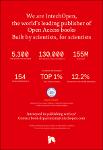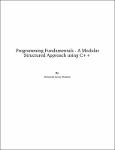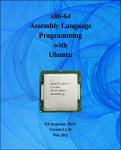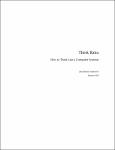Tìm kiếm
Tác giả
- Osman, Ahmed I. (5)
- Daqing, Ma (3)
- Jorgensen, Ed (3)
- Li, Yan (3)
- Sau >
Chủ đề
- kinh tế (26)
- Economics (12)
- programming (10)
- XRD (10)
- Sau >
Năm xuất bản
- 2020 - 2025 (2125)
- 2010 - 2019 (128)
- 2000 - 2009 (9)
- 1999 - 1999 (1)
Kết quả tìm kiếm
"This second edition of Database Design book covers the concepts used in database systems and the database design process. Topics include:
The history of databases
Characteristics and benefits of databases
Data models
Data modelling
Classification of database management systems
Integrity rules and constraints
Functional dependencies
Normalization
Database development process
New to this edition are more examples, highlighted and defined key terms, both throughout and at the end of each chapter, and end-of-chapter review exercises. Two new chapters have been added on SQL, along with appendices that include a data model example, sample ERD exercises and SQL lab with solutions" |
In this chapter, the life cycle assessment was presented as a tool to implement sustainable development in the bioeconomy and circular economy. Bulky waste includes large items such as furniture, doors, flooring and mattresses. The management of bulky waste is a serious problem for European countries. The URBANREC project proposed a solution to this problem through the use of new technologies for the bulky waste processing. The aim of the URBANREC project is to implement an eco-innovative, integrated system of bulky waste management and demonstrate its effectiveness in various regions of Europe. The project has received funding from the European Union. In this chapter, the LCA environmental analysis was performed for the technology of grinding bulky waste using a water jet by the Ec... |
This collection highlights a key metaphor in contemporary discourse about economy and society. The contributors explore how references to reality and the real economy are linked both to the utopias of collective well-being, supported by real monies and good economies, and the dystopias of financial bubbles and busts, in which people’s own lives “crash” along with the reality of their economies. An ambitious anthropology of economy, this volume questions how assemblages of vernacular and scientific realizations and enactments of the economy are linked to ideas of truth and moral value; how these multiple and shifting realities become present and entangle with historically and socially situated lives; and how the formal realizations of the concept of the “real” in the governance of ec... |
This open access book explores the most recent trends in the EU in terms of development, progress, and performance. Ten years after the 2008 economic crisis, and amidst a digital revolution that is intensifying the development race, the European Union, and especially Central and Eastern Europe, are ardently searching for their development priorities. Against this background, by relying on a cross-national perspective, the authors reflect upon the developmental challenges of the moment, such as sustainable development, reducing inequality, ensuring social cohesion, and driving the digital revolution. They particularly focus on the relation between the less-developed Eastern part of the EU and its more developed Western counterpart, and discuss the consequences of this development gap... |
"Programming Fundamentals - A Modular Structured Approach using C++ is written by Kenneth Leroy Busbee, a faculty member at Houston Community College in Houston, Texas. The materials used in this textbook/collection were developed by the author and others as independent modules for publication within the Connexions environment. Programming fundamentals are often divided into three college courses: Modular/Structured, Object Oriented and Data Structures. This textbook/collection covers the first of those three courses.
The learning modules of this textbook/collection were written as standalone modules. Students using a collection of modules as a textbook will usually view it contents by reading the modules sequentially as presented by the author of the collection.
The learning ... |
The Shadow Economy: Challenges to Economic and Social Policy, The Concept of the Survey of Businesses and Entrepreneurs Operating Informally, Causes of the Shadow Economy, What Is the Extent of the Shadow Economy in Serbia? Shadow Economy in the Business and Entrepreneurial Sectors, Effects of Formalisation of the Shadow Economy, Analysis of the Administrative Capacity of the Institutions in Charge of Overseeing the Operations of Business Entities, Main Findings and Recommendations, Executive Summary. |
The purpose of this text is to provide a reference for University level assembly language and systems programming courses. Specifically, this text addresses the x86-64 instruction set for the popular x86-64 class of processors using the Ubuntu 64-bit Operating System (OS). While the provided code and various examples should work under any Linux-based 64-bit OS, they have only been tested under Ubuntu 14.04 LTS (64-bit). The x86-64 is a Complex Instruction Set Computing (CISC) CPU design. This refers to the internal processor design philosophy. CISC processors typically include a wide variety of instructions (sometimes overlapping), varying instructions sizes, and a wide range of addressing modes. The term was retroactively coined in contrast to Reduced Instruction Set Computer (RISC... |
"We set out to design an introductory course governed by four themes:
Give students a good idea of what a career in MIS looks like by doing MIS.
Enhance the professionalism of deliverables by teaching design and usability concepts.
Promote creativity by assigning projects that demand it.
Teach students about cloud computing by having them do cloud computing.
Students in an introductory Management Information Systems (MIS) course often ask what a career in MIS looks like. Lacking a clear vision, they make their own assumptions. Often they assume the career involves programming with little human interaction. That MIS is a technical field could not be further from the truth. MIS job descriptions typically require candidates to be able to collaborate, communicate, analyze needs a... |
Computers are everywhere in our daily lives. Between the desktop, laptop, phone, bank, and vehicle, it is difficult to completely get away from computers. It only makes sense to learn a little about how a computer really works.This text provides an introduction to programming and problem solving using the Fortran 95/2003/2008 programming language. This introduction is geared for non-computer science majors. The primary focus is on an introduction to problem solving and algorithm development. As such, many details of the Fortran 95/2003/2008 language are omitted. |
"The title of this book was originally Think Perl 6, but since Perl 6 has been renamed Raku, we have also changed the title of the book.
Think Raku is an introduction to computer science and programming intended for people with little or no experience.
This aim of this book is not primarily to teach Raku, but instead to teach the art of programming, using the Raku language. After having completed this book, you should hopefully be able to write programs to solve relatively difficult problems in Raku, but my main aim is to teach computer science, software programming, and problem solving rather than solely to teach the Raku language itself.
Think Raku is a free book available under a Creative Commons license. Readers are free to copy and distribute the text; they are also ... |










